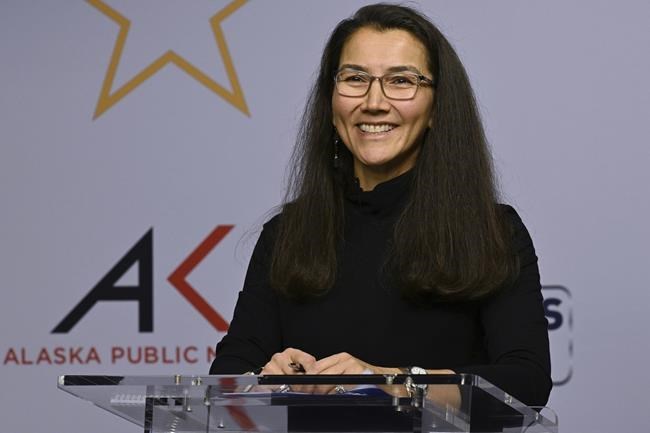
Democratic Rep. Mary Peltola listens to a question during a debate against Republican Nick Begich on live television at Alaska Public Media on Thursday, Oct. 10, 2024. (Bill Roth/Anchorage Daily News via AP)
Republished October 11, 2024 - 1:48 PM
Original Publication Date October 10, 2024 - 11:21 PM
JUNEAU, Alaska (AP) — Democratic U.S. Rep. Mary Peltola of Alaska and her main rival for the state's only House seat, Republican Nick Begich, faced off in a wide-ranging debate late Thursday, touching on topics including support for Ukraine, abortion and guns.
The briskly paced debate in Anchorage saw both candidates make their pitch to voters with just weeks until the Nov. 5 election. Peltola is seeking to stave off GOP efforts to reclaim the seat that Republican Rep. Don Young held for 49 years before his death in 2022.
Peltola, who is Yup'ik, won special and regular elections for the seat that year and became the first Alaska Native in Congress. Begich, who has been endorsed in this race by former President Donald Trump, was among the opponents Peltola defeated in 2022.
Peltola has tried to distance herself from presidential politics, declining to endorse Vice President Kamala Harris, while also saying she is not voting for Trump. During the debate, she said she doesn't see the world through a partisan lens and is focusing on her own race. She declined to say if she'd vote for Harris.
“It's a secret ballot,” Peltola said, adding that she thinks both Harris and Trump have flaws. “I think that much of the concern that we have will be around who are they choosing as their senior advisers?”
On a foreign policy issue, Peltola said it's important the U.S. support Ukraine in its fight against Russia.
“I think that they’re fighting our war in many ways, and I do support the efforts that they’re making,” she said.
Begich said the needs of Americans should be prioritized.
“I want to make sure that we’re putting the needs of Americans first, that we’re not putting other people’s wars on our national credit card expecting future generations to pay for them,” he said.
The candidates were asked if they'd support a federal ban on abortion or a federal right to abortion. Begich said he would not support either. He said the matter should be left to the states.
Peltola, who has made reproductive rights a key issue in her campaign, said politicians have no business being part of the discussion.
Abortion “should be safe, legal and rare,” she said. “We should be doing everything we can to prevent unwanted pregnancies. And meantime, we should be protecting the lives of women who have complicated medical situations.”
In Alaska, the state Supreme Court has interpreted the state constitution’s right to privacy as encompassing abortion rights.
On the issue of guns — protecting schools and gun rights — both talked about the importance of gun safety and responsible ownership. Guns are common in Alaska, where hunting is part of the way of life.
Peltola said school shootings often involve someone “who is isolated, who doesn’t feel seen or heard."
“We need to make sure that every child, every child in our community, every child in our school feels seen and heard,” she said. "We need to make sure that we don’t have people in isolation, and we need to do as much as we can as gun owners to protect and safeguard guns and ammunition from getting in the wrong hands.”
Begich said competitive youth shooting leagues help train young people about gun safety and responsible ownership and is something that should continue to be invested in.
One of the debate questions came from the president and CEO of the Alaska Black Caucus, who wanted the candidates to identify initiatives they'd propose to address economic disparities and create opportunities for underrepresented communities.
Peltola said she wants to work for all Alaskans and that the best way to do that is to look at collective challenges, such as high heating and energy costs.
“I think that it’s important that we are really intentional about making sure that everybody benefits from the programs that we work on,” she said.
Begich said it's important that everyone “have a seat at the table."
“No matter where you started in life, no matter who you are, what community you're a part of, what ethnic group you're part of, what religion you have, it’s important because that’s the promise of America,” he said.
He said there is disparity in the state's K-12 education system and more must be done to ensure that students have access to a high-quality education, including at the university level.
Peltola and Begich are the most prominent candidates in the race, which also includes Alaskan Independence Party candidate John Wayne Howe and Eric Hafner, a Democrat with no apparent ties to the state who is serving a 20-year prison sentence for threatening authorities and others in New Jersey.
The debate audience was told that only candidates who got at least 5% of the vote in the primary were invited to Thursday's debate. Neither Howe nor Hafner met that threshold.
News from © The Associated Press, 2024